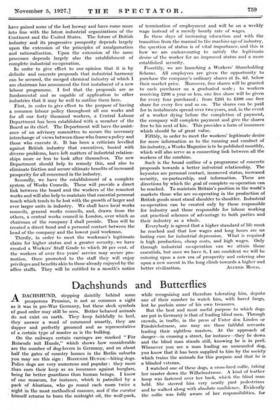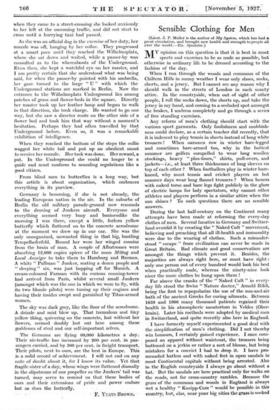Dachshunds and Butterflies
ADACHSHUND, stepping daintily behind some prosperous Prussian, is not as common a sight as it was in pre-War Germany, but these sleek symbols of good order may still be seen. Better behaved animals do not exist on earth. They keep faithfully to heel, they answer a word of command smartly, they are dapper and perfectly groomed and as representative of a certain type of master as is the bulldog.
On the railways certain carriages are marked " Fur Reisende mit Hunde," which shows how considerable are the number of dog-lovers in Germany, and on about half the gates of country houses in the Berlin suburbs you may see this sign : BISSENDE HUNDE—biting dogs. Police dogs are very numerous and popular : they more than earn their keep as an insurance against burglars, being far better guardians than human beings. I know of one museum, for instance, which is patrolled by a pack of Alsatians, who go round each room twice a night in 'the most methodical manner, and if the curator himself retina to burn the midnight oil, the wolf-pack, while recognizing and therefore tolerating him, depute one of their number to watch him, with bared fangs, lest he purloin some of his own treasures.
But the best and most useful purpose to which dogs are put in Germany is that of leading blind men. Through crowds, in traffic, in the press of Unter den Linden or Friedrichstrasse, one may see these faithful servants leading their sightless masters. At the approach of danger—in crossing a street, for instance—they lie down and the blind man stands still, knowing he is in peril. Whenever you see a man leading an unmuzzled dog, you know that it has been supplied to him by the society which trains the animals for this purpose and that he is a blinded veteran.
I watched one of these dogs, a cross-bred collie, taking her master down the Wilhelmstrasse. A kind of leather hoop was fastened over her back, which the blind man held. She steered him very neatly past pedestrians and he walked along with absolute confidence. Evidently the collie was fully aware of her responsibilities, for when they came to a street-crossing she looked anxiously to her left at the oncoming traffic, and did not start to ,cross until a hurrying taxi had passed.
As she was an official dog in the exercise of her duty, her muzzle was off, hanging by her collar. They progressed at a smart pace until they reached the Wilhehnsplatz, where she sat down and waited, while a passer-by was consulted as to the whereabouts of the Underground. Even then, she kept a watchful eye on her master, and I am pretty certain that she understood what was being said, for when the passer-by pointed with his umbrella, her gaze turned to the large " U " with which the Underground stations are marked in Berlin. Now the entrance to the Wilhelmsplatz Underground lies among patches of grass and flower-beds in the square. Directly her master took up her leather hoop and began to walk in that direction, she took charge. He wanted to go one way, but she saw a directer route on the other side of a flower bed and took him that way without a moment's hesitation. Perhaps they had often travelled by that Underground before. Even so, it was a remarkable exhibition of intelligence.
When they reached the bottom of the steps the collie wagged her white tail and put up an obedient snout to receive her muzzle. Her task was done. Her reward, a pat. In the Underground she could no longer be a guide and must conform to muzzling regulations like a good citizen.
From blind men to butterflies is a long way, but this article is about organization, which embraces everything in its purview.
Germany is becoming, if she is not already, the leading European nation in the air. In the suburbs of Berlin the old military parade-ground now resounds to the droning of Junkers aircraft. Everyone and everything seemed very busy and businesslike the morning I was there, except a little, forlorn yellow butterfly which fluttered on to the concrete aerodrome at the moment we drew up in our car. She was the only unorganized, unwanted thing in that big, bustling Tempelhoferfeld. Round her were her winged cousins from the brain of man. A couple of Albatrosses were absorbing 12,000 copies apiece of the noon Mittag and Local Anzeiger to take them to Hamburg and Bremen. A white " Pullman " Junk er, seating a dozen people and " sleeping " six, was just hopping off for Munich. A cream-coloured Farman with its curious conning-tower had arrived from Paris, whilst several small Junkers (amongst which was the one in which we were to fly, with its two blonde pilots) were tuning up their engines and having their insides swept and garnished by Titan-armed women.
The sky was dark grey, like the floor of the aerodrome. A drizzle and mist blew up. That tremulous and tiny yellow thing, quivering on the concrete, lost without her flowers, seemed doubly lost out here among these goddesses of steel and our self-important selves.
The Germans are flying 60,000 kilometres a day. Their air-traffic has increased by 200 per cent. in pas- sengers carried, and by 500 per cent. in freight transport. Their pilots, next to ours, are the best in Europe. This is a solid record of achievement. I will not end on any note of doubt about it, for I know its -value.. Yet that fragile sister of a day, whose wings were flattened dismally in the slipstream of our propeller as the Junkers' tail was turned, may serve to remind us that these bodies of ours and their extensions of pride and power endure but as does the butterfly.
- F. YEATS-BROWN,



















































 Previous page
Previous page